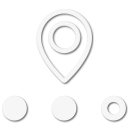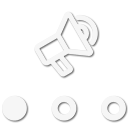As more and more newcomers have begun to enjoy Overlanding, I have begun to see the question arise more frequently on what first basic mod or equipment they should get. This is a difficult question to answer as the answer is heavily based on the type of Overlanding they wish to do and the type of vehicle equipment they currently have as well as experience level.
Lets say for example you just wish to go down to the State Park and stay at a camp site for a weekend, this requirement is vastly different than hitting the Rubicon Trail for a week long expedition. But in either situation the single commonality will be to know ones vehicle, it's abilities, and how to perform basic repairs and maintenance.
With that being said, there is no substitute for a good service manual, in book form as there is often little to no access to the internet where Overlanders go. In addition to the service manual, you will need quality set of tools that can accommodate the majority of fittings on your vehicle, tire repair kit, ratchet straps. There is little need for all the specialty tools as if has come down to replacing a broken axel then you will have more to worry about, such as getting home, than fixing that broken axle on the trail; unless you're the hard core mechanic type.
As for vehicle recovery the oldies still work. Gloves, shovel, come along winch, high lift jack, and tree protector all still do the trick and will get you back home just as well as that fancy new poly line winch and land anchor.
In addition to the before mentioned items, it is also a good idea to take some commonly used spare parts such as fuses, electrical tape, radiator coolant, engine oil, transfer case oil, and automatic transmission fluid, silicon and RTV sealant, bits and bobs such as hose clamps and baling wire, U/V stable zip ties. Once again this list can be increased or decreased based on your trip, which brings us to trip planning.
Proper trip planning is essential! This can not be emphasized enough know your limitations, surroundings, weather conditions and equipment.
Most importantly, always file a trip plan and DO NOT deviate from the trip plan without providing notification.
In short:
Know your vehicle's limitations and abilities
Know how to conduct basic repairs and maintenance
Hard copy of your vehicles service manual
Quality set of tools
Common spare parts and fluids
Recovery equipment
Proper trip planning/Emergency points of contact/ Planned check in times and return date
P.S. You may wish to also throw in a cheater bar and a block of wood to place under that jack to prevent sinking into soft soil.
Lets say for example you just wish to go down to the State Park and stay at a camp site for a weekend, this requirement is vastly different than hitting the Rubicon Trail for a week long expedition. But in either situation the single commonality will be to know ones vehicle, it's abilities, and how to perform basic repairs and maintenance.
With that being said, there is no substitute for a good service manual, in book form as there is often little to no access to the internet where Overlanders go. In addition to the service manual, you will need quality set of tools that can accommodate the majority of fittings on your vehicle, tire repair kit, ratchet straps. There is little need for all the specialty tools as if has come down to replacing a broken axel then you will have more to worry about, such as getting home, than fixing that broken axle on the trail; unless you're the hard core mechanic type.
As for vehicle recovery the oldies still work. Gloves, shovel, come along winch, high lift jack, and tree protector all still do the trick and will get you back home just as well as that fancy new poly line winch and land anchor.
In addition to the before mentioned items, it is also a good idea to take some commonly used spare parts such as fuses, electrical tape, radiator coolant, engine oil, transfer case oil, and automatic transmission fluid, silicon and RTV sealant, bits and bobs such as hose clamps and baling wire, U/V stable zip ties. Once again this list can be increased or decreased based on your trip, which brings us to trip planning.
Proper trip planning is essential! This can not be emphasized enough know your limitations, surroundings, weather conditions and equipment.
Most importantly, always file a trip plan and DO NOT deviate from the trip plan without providing notification.
In short:
Know your vehicle's limitations and abilities
Know how to conduct basic repairs and maintenance
Hard copy of your vehicles service manual
Quality set of tools
Common spare parts and fluids
Recovery equipment
Proper trip planning/Emergency points of contact/ Planned check in times and return date
P.S. You may wish to also throw in a cheater bar and a block of wood to place under that jack to prevent sinking into soft soil.
Last edited:



